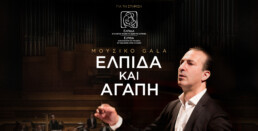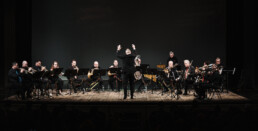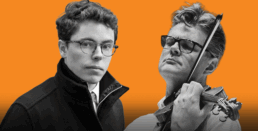From Europe to America
Antonin Dvorak and Manos Hadjidakis are two completely different composers, originating from different countries and centuries, with different styles, lives and experiences. However, they had something unexpected in common: They spent some years in the United States of America and more specifically in New York; the former from 1892 to 1895 and the latter from 1966 to 1972. Their two works performed at the concert are transcriptions of two famous works that the two composers conceived and completed in the United States.
Lyric Quartets
Scarcely did the great Italian opera composers, Giuseppe Verdi and Giaccomo Puccini take a "break" from their operetta compositions to create works not involving human voice. Even in such cases, their infallible sensor and their plethoric operetta universe was transmitted unchanged to the scores of their musical instruments, full of lyricism, emotions and, of course, "vocal" scale melodicity.
Musical Gala of Hope and Love
“ELPIDA-Association of Friends of Children with Cancer”, in collaboration with Megaron The Athens Concert Hall and Athens State Orchestra, are organizing the unique Musical Gala, “Hope and Love”, with the participation of the internationally renowned maestro Alvise Casellati, on Friday, February 13, 2026, at 8:30 p.m., in the Christos Lambrakis Hall.
The leading conductor and Artistic Director of Palermo’s Teatro Massimo, Alvise Casellati, in his first appearance in Greece, joins forces with the Athens State Orchestra to create an inspiring, refined program, hymn to love, with famous arias from beloved operas by Verdi, Puccini, Gounod, Wagner and Rossini. The internationally renowned Greek tenor Christina Poulitsi and the distinguished Italian tenor Giorgio Berrugi will accompany this unique musical journey in classical music with their voices. An evening where the power of music turns into an act of love for the children who are fighting childhood cancer. All the proceeds of the show will support the goals of ELPIDA-Association of Friends of Children with Cancer.
200 years of Johann Strauss
Certainly, Johann Strauss (son) is one of the main responsible for the immense popularity that the waltz dance acquired in the 19th century and for this he rightfully earned the designation "king of the waltz"; yet even more impressive is the fact that his vast oeuvre remains fascinating to this day, capable of touching the heart of a wide audience around the world, always pleasant, welcomed and, of course, very harmonious with the smile of optimism for the advent of a New Year... It is with such a "smile" that the Athens State Orchestra honours the great Austrian composer and welcomes the New Year with his music, under the baton of the multi-award-winning and rising Georgian conductor, Mirian Khuhunaishvili.
Mozart and the Magic of Christmas
The "Friends of Music Kalamata Association" and the Athens State Orchestra welcome Christmas with a glamorous Gala at the Kalamata Dance Megaron: a night of supreme musical art and festive spirit. Conducted by the acclaimed maestro Nikos Haliasas, the Orchestra presents a programme combining timeless classical repertoire masterpieces with beloved Christmas melodies featuring the rising and particularly talented pianist Chrysanthos Therianos, who performs Wolfgang Amadeus Mozart's Piano Concerto no. 24 KV 491, one of the great composer's most emotional pieces. Chrysanthos Therianos excelled in the competition section of the programme "Listening to the Young" 2025 and the Athens State Orchestra chose him among the winner musicians to participate in this concert.
The dramatic Concerto is followed by the glorious Mozart's Symphony no. 41, the "Jupiter's Symphony", a piece full of joy. The event also comprises a part connecting classical music and Christmas tradition: from the melodic Franz Shchubert's Ave Maria to the traditional Greensleeves, the well-known O Come, All Ye Faithful and two among the most joyful and recognizable Leroy Anderson's festive pieces.
Around the World in 80ish minutes
The honourable Phileas Fogg travelled around the world in 80 (+1) days, spending a fortune like a true gentleman in order to win a bet. Alternatively, he might just as well have settled deeper into the armchair of his London club and journeyed in his imagination across seas and continents — ears open, and in the company of dazzling soloists, the city’s State Orchestra with a festive, brilliant, and highly virtuosic programme, and of course Alexandros Myrat, a familiar friend of Megaron. Before him (and us) will parade Gershwin’s syncopated jazz swing, the nostalgic waltzes of Hisaishi and Shostakovich, the African-American rhythms of Florence Price, and Chen Yi who transports us for a while to 19th-century China. Johann Strauss makes a brief appearance, as does Ravel with his jester, Skalkottas with a sparkling miniature for xylophone, the dazzling John Williams and Ennio Morricone, Villa-Lobos with his beguiling Bachiana, and Sarasate with his fiery Gypsy Airs. And for the finale, we head to South America, so that we — together with our Phileas — may welcome the New Year dancing to Latin American rhythms.
Bassoon ensemble
A concert with a bassoon ensemble is a unique musical experience that combines warm, deep and playful sounds! Modest Mussorgsky's "Pictures at an Exhibition" stands at the center of the programme, transcribed by the great bassoon soloist Dag Jensen, and moves us to a world full of harmony and original sound styles. An evening that promises to surprise and captivate the audience by revealing the wide expressive range of the instrument, from velvety bass notes to dynamic, humorous, virtuosic passages!
Cross-Over
On the occasion of the 90 anniversary of Elvis Presley's death, the Metallon Ensemble, with the collaboration of the singer Nikolas Maraziotis and conducted by Nikos Haliassas, proposes a programme comprising some of the most beloved and emblematic songs of the man who was also called "The king of Rock and Roll" or simply the "King" and considered as one among the greatest artists in the history of spectacles. Elvis Presley performed and also developed all kinds of music that appeared in America. From Rockabilly, Hillbilly, Rock’n’Roll, Rhythm’n’Blues, Country, Gospel, Spitituals, Soul, Pop, Blues, Rock, Ballads to Bossa Nova. A perfectionist artist who, was not simply a singer; on the contrary he highlighted in such a particular way several songs which were forgotten or not rather impGeneraactful.
Echoes of war: Mahler and Korngold
The young lead musician John Warner, a rising star of the British music spectrum, apart from being a conductor of the Oxford Opera, is also the founder of the "Orchestra for the Earth" which acts at a global level, combining music with ecological awareness. In his debut with the Athens State Orchestra, he shall present two works of major Austrian composers who have many and essential common features, although born with a gap of more than forty years. Mahler and Korngold are the two sides of the same musical "coin": the former, introversive and hypersensitively psychoanalytic, the latter, extroversive and "aggressively" charming, they share the same hyperromantic language, sensual, lavish, delightful in all aspects!
Late night with the Athens State Orchestra
The Estonian lead musician, Anu Tali is active in both Europe and America, and distinguished as one among the most active and recognized female conductors of the 21st century. It´s the third time that the Athens State Orchestra receives Anu Tali, with the certainty that she shall leave a mark of woman elegance and finesse with a purely French proramme, proving that what sounds "light" may at the same time be very serious, essential and deep. Together with Anu Tali, the dynamic Greek piano soloist, Nefeli Mousoura in one of the most famous and impressive French works for piano, Saint-Saëns's concerto No.2







